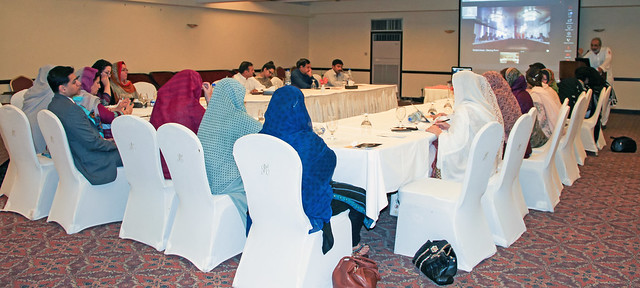Pakistan-Afghanistan dialogue on women’s situation in displacement: Challenges and way forward for policy and practice
Date:
[PRESS RELEASE]
Author: Faria Salman
Islamabad, Pakistan – A first joint initiative between Pakistan and Afghanistan took place on Thursday 25 August 2016 to assist women during displacement to enhance synergies so regional and provincial responses and coordination mechanisms incorporate women and girls as change agents and promote gender equality commitments in disasters and emergencies.
The meeting ‘Pakistan-Afghanistan dialogue on women’s situation in displacement: Challenges and way forward for policy and practice’, was hosted by the Honorable Meraj Humayun Khan, Chairperson of the Provincial Women Parliamentary Caucus of Khyber Pakhtunkhwa, with support from UN Women (the United Nations Entity for Gender Equality and the Empowerment of Women) along with counterparts virtually connected from Kabul, Afghanistan. Participants included displaced women, Members of Parliament, women machineries and development and humanitarian actors.
![[IMAGE]](/sites/default/files/Field%20Office%20ESEAsia/Images/2016/08/IMG_0497-450px.jpg?la=en)
The UN Women Pakistan and Afghanistan Country Offices presented findings from a number of inclusive Focus Group Discussions held with over 150 women and girls affected by displacement - Afghan Sikh and refugee women migrants ‘hosted’ in Pakistan and returnees to Afghanistan, and Pakistan’s internally dislocated women and returnees due to military operation against non-state actors. In sharing their journey of dislocation and survival these women and girls identified frequent and emerging issues faced by them during emergencies, displacement and in reconstruction. Findings from both sides of the border referred to: women’s role in decision-making before, during and after displacement; camp and settlement facilities; access to health services, educational facilities and income generating opportunities; possession of identity and/or residency cards; and transportation and financial assistance.
Members of the Women Parliamentary Caucus, Khyber Pakhtunkhwa’s Provincial Assembly and Afghanistan’s Parliament following a plenary discussion based on the findings of the focus group discussions with displaced women and girls, incorporated their recommendations in a Joint Resolution.
Salient features of the Joint Resolution to make regional and provincial responses effective and more responsive to the needs of women, girls and vulnerable persons, and to support their safe and dignified return, include:
![[IMAGE]](/sites/default/files/Field%20Office%20ESEAsia/Images/2016/08/IMG_0517-675px.jpg?la=en)
(i) Ensuring women’s participation in the return processes including their meaningful role during the return intention surveys; (ii) Adopt an inclusive community-based approach with women’s participation at all levels including coordination of relief efforts as well as for identifying sustainability of families whilst displaced, while taking into account their healthcare, education, status; (iii) Providing guidance for economic empowerment and earning livelihoods by creating skill building trainings opportunities for the women and child headed households in particular; (iv) Lobby for allocation of adequate dedicated funds in the budgets/annual development plans of the provinces and districts experiencing consistent emergencies; (v) Develop institutional mechanisms for the collection and analysis of disaggregated data by sex, age, vulnerability and location; (vi) Oversight of processes providing identification documents (Tazkira in Afghanistan and Computerized National Identity Cards in Pakistan) to every woman that allows them an identity and access to food rations, healthcare facilities, non-food items and education for their children; and (vii) Increase access to social spaces to interact, share experiences and knowledge sharing with respect to displacement related issues and challenges for women and children in order to strengthen indigenous coping strategies and mechanisms.
This dialogue was carried out under UN Women in Pakistan’s ‘Women’s Leadership in Social Reconstruction’ programme, with support from the Government of Denmark to enhance synergies so (i) Policy and institutional level responses and coordination mechanisms incorporate women and girls as change agents and promote gender equality commitments in disasters and emergencies, and (ii) Stabilization, social reconstruction and peace building promote security and protect the rights of women and girls. The Provincial Disaster Management Authority of Khyber Pakhtunkhwa facilitated UN Women in conducting the focus group discussions with displaced women and girls.
Photo Gallery
For more information:
Please contact: Faria Salman
Strategic Management and Partnerships Officer &
Communications Focal Point for UN Women Pakistan
Email: [ Click to reveal ]
